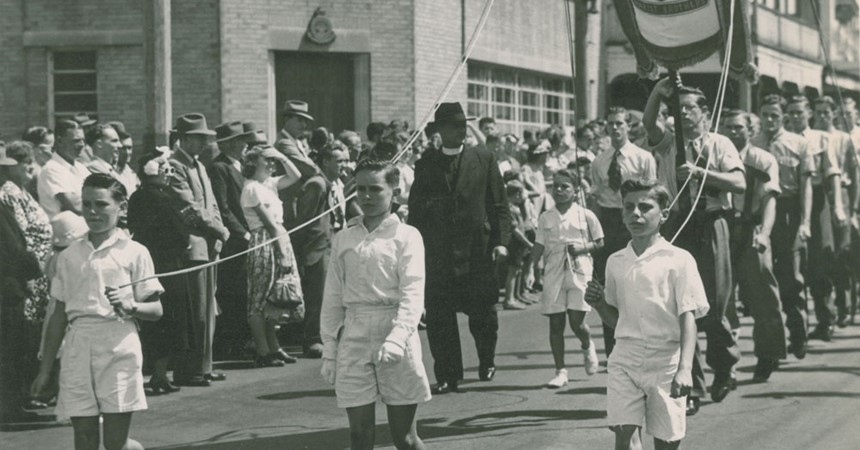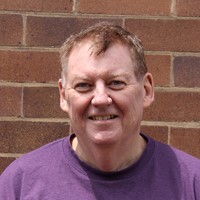The questions were obvious: Who are these people? Were they known to me, or, at least, familiar? (Check faces). What was the occasion? (Check location, dress, posture, positioning of subjects, facial expressions, props). When was the photo taken? (Check features of location, dress and apparent age of subjects). Why was the photo taken? In some cases, answers were forthcoming. In others, the interrogation of these photos generated further questions and a need to undertake some research.
An examination of old family photos is just one way we are reminded that each of us has our “story” – our personal history. A camera that I still own, but for which I can no longer buy film, is a further reminder that the way my personal history is recorded today, and will be preserved for the future, has changed radically as a result of developments in the technology of storing and reproducing information. However, what doesn’t change is the desire of human beings to record their history, by whatever means are available, and to preserve it for themselves and for future generations.
Our personal history provides us with a context through which we can establish our identity and sense of belonging in contemporary society. From an early age we become aware that our personal journey is moulded by, and entwined with, that of our parents and family, our school, our suburb or town, our state, our nation and our world. As individuals we are formed through the influences of the past, live our lives in the company of others who share our contemporary world and eventually pass on our influence to future generations.
History – personal and otherwise – comprises not just one story, or version, but many. Think for a moment of the different perspectives that are brought to one single event such as a child’s first day at school. There is the perspective of the child itself, as well as of its parents, and of the teachers who will receive the new student. Each will view this event in different ways. Yet it is the same event. These different perspectives deepen and enrich the meaning and significance of the event itself as well as our individual and collective responses to it.
Last year, Australians commemorated one hundred years since the Anzac landings at Gallipoli. This significant event in our national life can be viewed from many perspectives: the participating soldiers themselves on each side, their families, their military generals and tacticians, contemporary national leaders, historians and so on. In 2016, we view this event from a perspective formed through our knowledge of the event one hundred years after it occurred and its various historical interpretations. In addition, the influence of popular culture (feature films, documentaries, plays, Anzac Day ceremonies), our own society’s views on the desirability of war as a means of solving conflicts, nationalism, patriotism and so on all work together to guide our contemporary perspective.
For most of us, our knowledge of an event and its historical interpretations are a result of formally studying history at school. For people of my generation this meant an emphasis on the historical narrative; in other words, the “facts”. The teaching approach was centred on students learning historical content from a textbook. The author of such textbooks was regarded as the single authority when it came to interpreting such content. As students we were encouraged to “learn the facts” and to be able to reproduce the content and its authorised interpretation in written form, usually an essay. As a result, we know our historical facts (dates, people, places, movements, battles, revolutions and so on) pretty well and can write reasonable essays. In my case, I enjoyed my historical study at school to the extent that I pursued studies in history at university and went on to become a teacher of English and History.
Students who study history at school these days have a very different experience. Of course, they still have to master “the facts” but the analysis of the significance of those “facts” is within the framework that there is never one uncontested version. They learn that history is all around us and that useful historical information can be found in physical, as well as written, visual and other evidence − such as the old family photos I was looking at recently. They learn how to interrogate these various sources, how to identify their strengths and weaknesses and to appreciate the historical context which led to their creation. Students of history today are involved in investigating history, using skills and knowledge which encourage inquiry and research, and communicating their findings in a variety of different and appropriate ways.
For many reasons, learning history adds value to our lives. History connects us with our past, and through that connection, helps us to make sense of our present as well as to appreciate the ways we can influence the future. There are lessons we can learn from history, individually and collectively, that help us to live more authentic and positive lives and avoid the mistakes of the past. History stimulates our curiosity and gives us skills in analysis, critical thinking and research which are useful in leading productive and fulfilling lives. These skills empower us to be useful citizens and contributors to society in our daily living, to think more about the motives behind the actions of others and the context influencing them, to frame an informed argument using appropriate evidence and to understand why change is a necessary part of life. Occasionally, they help us to unlock some of the secrets of old family photos, identify what still remains to be found and the means to find answers.























































































